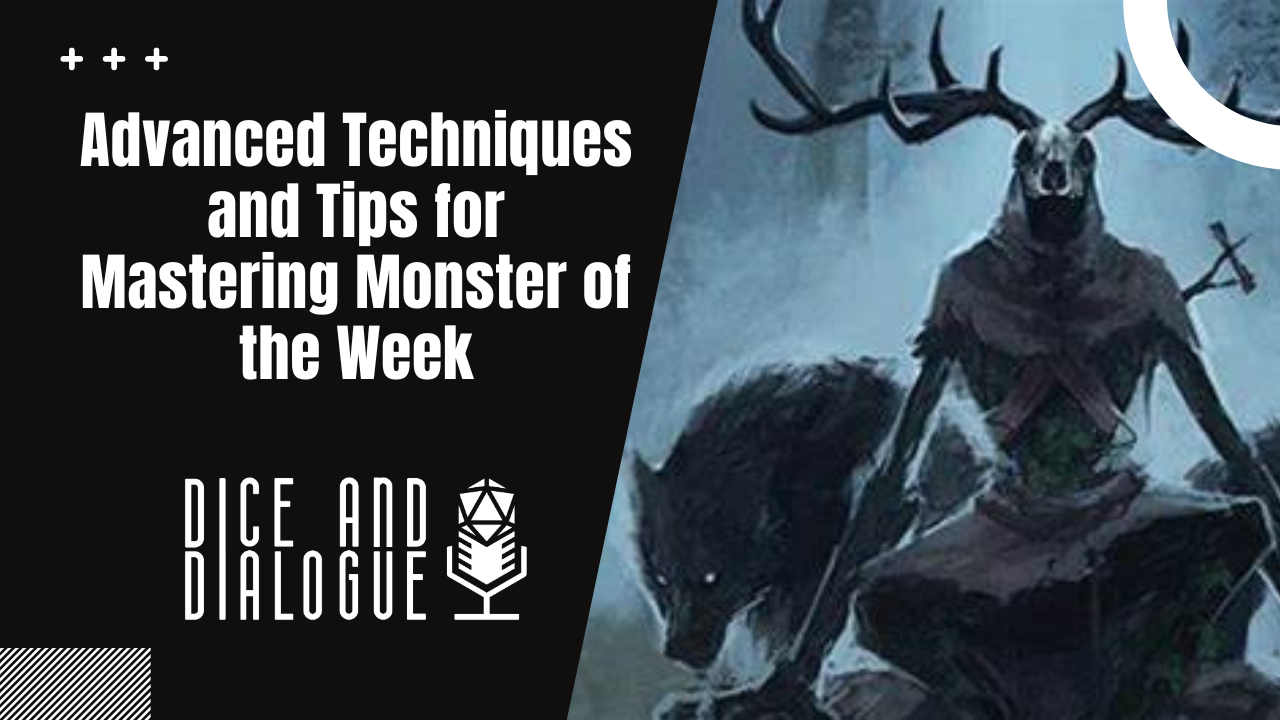Advanced Techniques and Tips for Mastering Monster of the Week
Do you struggle with balancing combat and investigation in your RPGs? Monster of the Week offers a unique approach that can help. Tune in to learn how to keep your players engaged and entertained. This blog and podcast are the third part in a 3 part mini-series. You can find part one here.
Listen to the full Podcast of Dice and Dialogue as we talk Monster of the Week or on Youtube.
What is Monster of the Week?
In a sea of tabletop RPGs, Monster of the Week stands tall as a beast of its own. This game takes a refreshing approach, shedding complex rule systems in favor of fast-paced, narrative-driven action. Set in a contemporary world overrun by creatures that go bump in the night, Monster of the Week casts players as hunters—ordinary folks who have taken it upon themselves to battle the forces of darkness.
As a hunter, you'll investigate eerie occurrences, gather clues, and engage in heart-pounding battles with terrifying monsters. Inspired by beloved TV shows like Buffy the Vampire Slayer, The X-Files, and Supernatural, Monster of the Week lets you channel your inner hero and create thrilling, monster-of-the-week adventures that rival your favorite on-screen hunters.
Are you ready to take your Monster of the Week campaigns to the next level? In this comprehensive guide, we'll delve into advanced techniques and tips that will help you create engaging and memorable experiences for both players and Game Masters (GMs). From custom moves and building tension to collaborative storytelling and campaign longevity, let's unlock the secrets of mastering Monster of the Week.
Custom Moves and Adaptations: Unleashing Creativity
Custom moves are the heart and soul of Monster of the Week, allowing you to tailor the game to your unique campaign vision. In this section, we'll explore advanced techniques for crafting custom moves that not only suit different settings, genres, or campaign themes but also enhance gameplay and storytelling. Dive into examples and gain inspiration on how to create compelling custom moves that will surprise and challenge your players.
Building Tension and Memorable Moments: The Art of Suspense
Tension is what keeps players on the edge of their seats, eagerly awaiting the next twist or turn in the story. We'll delve into the art of building tension in Monster of the Week, exploring techniques such as pacing, foreshadowing, and creating challenging situations. Discover how to craft suspenseful moments that leave a lasting impact on your players and make your campaigns truly unforgettable.
Collaborative Storytelling: Uniting Players in Creativity
Monster of the Week thrives on collaboration, allowing players to become active participants in shaping the narrative. This section delves into advanced techniques for facilitating collaborative storytelling, including ways to involve players in co-creating the game's world, mysteries, and NPCs. Explore methods for encouraging player engagement, fostering inclusivity, and building a shared sense of ownership over the story.
Advanced GMing Strategies: Mastering the Art of Game Mastery
As the GM, you play a crucial role in guiding the Monster of the Week campaign. This section provides insights into advanced GMing strategies, equipping you with the tools to manage multiple storylines, handle unexpected player choices, and improvise on the spot. Discover techniques for keeping the game dynamic and engaging, while maintaining a balance between player agency and overarching narrative.
Deepening the Lore: Immersing Players in the Supernatural World
The rich lore and mythology of Monster of the Week offer countless opportunities for immersive storytelling. We'll take a deep dive into the various types of monsters, their origins, and how to incorporate them seamlessly into your campaigns. Learn how to create a captivating and expansive world that captures the imagination of your players, providing them with a sense of discovery and wonder.
Campaign Longevity and Endings: Sustaining Excitement to the Final Chapter
Keeping a Monster of the Week campaign fresh and exciting over time can be a challenge. This section explores strategies for managing campaign longevity, including methods for introducing new story elements, maintaining player interest, and overcoming narrative fatigue. Additionally, we'll delve into the art of planning for a satisfying campaign ending, tying up loose ends, and providing closure for players and their characters.
By embracing the advanced techniques and tips outlined in this guide, you'll elevate your Monster of the Week campaigns to new heights of excitement and engagement. From crafting custom moves and building tension to fostering collaborative storytelling and managing campaign longevity, these strategies will empower you to create immersive and memorable experiences for your players. Get ready to master the art of Monster of the Week and take your campaigns on an unforgettable journey.
Get ready to dive into the thrilling world of Monster of the Week—the hunt is on! Grab your copy here.
Capes and Crooks - A 5e Superhero RPG
Capes and Crooks utilizes the core rules for the 5th Edition of the world’s greatest roleplaying game and adds its own unique twist. You will take on the role of a superhero (or a villain if you prefer) and completely customize your character with unique origins, roles, powers, and alter-egos. With a group of friends and a bit of imagination, you will strike out on dangerous missions and terrifying challenges, from stopping bank robbers and handling deadly hostage negotiations to slaying monstrosities created from a mad scientist’s experimentations. You will also have to deal with the realities of a law and order society that doesn’t exactly look kindly on those with powers. This book contains a world setting, character creation rules, equipment, powers, enhancements, magic items/tech, monsters, villains & NPC’s, and a full adventure.
Capes and Crooks takes place in the ultra-modern world of Terra, a place of science, technology, evolution and even ancient lost magic. 25 years ago people around the world found themselves mysteriously imbued with fantastical gifts. Now called deviants, these people take on many roles as they struggle to find their place in this new world. Some wish to use their gifts to help others, some to gain wealth and power, and some to do evil to satisfy their darkness. In a world where what is right, and what is the law often conflicts, how will you choose to use your powers and conceal your identity from those who wish to stop you?
There will always be good and evil; light and dark. There will always be Capes and Crooks!
Get your copy here and make your next 5e tabletop adventure…super!
Unearthed Tips and Tricks
Player Tip: Setting Short-Term and Long-Term Goals for Your Character
As a player, setting goals for your character can help you stay engaged and invested in the game world. By giving your character both short-term and long-term goals, you can provide a sense of direction and purpose to their actions, and contribute to the overall narrative of the game.
Short-Term Goals: These are smaller, achievable goals that can be accomplished in a shorter period of time, such as completing a quest, defeating a particular enemy, or acquiring a specific item. Short-term goals provide a sense of accomplishment and progress and can keep the game moving forward.
Long-Term Goals: These are larger, more abstract goals that may take more time and effort to achieve, such as gaining political power, seeking revenge, or uncovering a hidden conspiracy. Long-term goals provide a sense of purpose and motivation and can help shape the character's development over time.
By setting goals for your character, you can create a more immersive and dynamic experience for both yourself and your fellow players. Here are some benefits of setting goals:
Increased engagement: By setting goals, you have a reason to pay attention to the game and stay invested in the story.
Clear direction: Goals provide a clear direction for your character's actions, and help you make decisions that are consistent with their motivations and desires.
Meaningful choices: Having goals gives you a framework for making choices that matter and have consequences, rather than simply reacting to the game world.
Collaborative storytelling: By setting goals, you can contribute to the overall narrative of the game and work with the DM and other players to create a more interesting and engaging story.
Setting goals for your character is an important part of the roleplaying experience. By giving your character both short-term and long-term goals, you can provide direction, motivation, and purpose to your actions, and contribute to a more immersive and engaging game world.
Thank you for reading our blog. If you enjoy the content and want to support us, visit our store or follow us on social media, join us on discord, youtube, and leave us a review.



